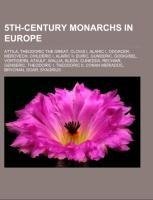
5th-century monarchs in Europe
Source: Wikipedia. Pages: 55. Chapters: Attila, Theodoric the Great, Clovis I, Alaric I, Odoacer, Merovech, Childeric I, Alaric II, Euric, Gunderic, Godigisel, Vortigern, Ataulf, Wallia, Bleda, Cunedda, Rechiar, Genseric, Theodoric I, Theodoric II, Conan... Viac o knihe
Produkt je dočasne nedostupný
16.54 €
bežná cena: 18.80 €
O knihe
Source: Wikipedia. Pages: 55. Chapters: Attila, Theodoric the Great, Clovis I, Alaric I, Odoacer, Merovech, Childeric I, Alaric II, Euric, Gunderic, Godigisel, Vortigern, Ataulf, Wallia, Bleda, Cunedda, Rechiar, Genseric, Theodoric I, Theodoric II, Conan Meriadoc, Brychan, Goar, Syagrius, Crimthann mac Énnai, Gunther, Hermeric, Catigern, Ceretic Guletic, Gibuld, Mac Cairthinn mac Coelboth, Gundobad, Ceredig, Rechila, Remismund, Aegidius, Chlodio, Aioulf, Sigeric, Cynog ap Brychan, Rugila, Énnae Cennsalach, Theodemir, Maldras, Salomon of Cornwall, Loarn mac Eirc, Fráech mac Finchada, Muiredach Muinderg, Glywys, Drest I of the Picts, Fincath mac Garrchu, Cinuit of Alt Clut, Veremund, Ernakh, Dengizich, Framta, Richimund, Thorismund, Elafius, Chilperic II of Burgundy, Valamir, Sárán mac Cóelbad, Frumar, Oisc of Kent, Gjúki, Fíachna Lonn mac Cóelbad, Gondioc, Uldin, Condlae mac Cóelbad, Octar, Einion Yrth ap Cunedda, Talorc I of the Picts, Erbin of Dumnonia, Gundomar I, Sangiban, Bisinus, Meirchion Gul, Charaton, Rhyddfedd Frych, Hermeneric, Fredebal, Giselher, Theudemeres, Chilperic I of Burgundy, Ellac, Karadach, Talorc m. Achiuir, Moreith ap Aidan, Tuldila. Excerpt: Attila ( or ; ?-453), more frequently referred to as Attila the Hun, was the ruler of the Huns from 434 until his death in 453. He was leader of the Hunnic Empire, which stretched from the Ural River to the Rhine River and from the Danube River to the Baltic Sea. During his reign he was one of the most feared enemies of the Western and Eastern Roman Empires. He crossed the Danube twice and plundered the Balkans, but was unable to take Constantinople. He also attempted to conquer Roman Gaul (modern France), crossing the Rhine in 451 and marching as far as Aurelianum (Orléans) before being defeated at the Battle of the Catalaunian Plains. Subsequently he invaded Italy, devastating the northern provinces, but was unable to take Rome. He planned for further campaigns against the Romans but died in 453. There is no surviving first-person account of Attila's appearance. There is, however, a possible second-hand source, provided by Jordanes, who cites a description given by Priscus. It suggests a person of Asian features. The origin of Attila's name is unclear. Pritsak considers it to mean "universal ruler" in a Turkic language related to Danube Bulgarian. Maenchen-Helfen suggests an East Germanic origin and rejects a Turkic etymology: "Attila is formed from Gothic or Gepidic atta, "father", by means of the diminutive suffix -ila." He suggests that Pritsak's etymology is "ingenious but for many reasons unacceptable". However, he suggests that these names were "not the true names of the Hun princes and lords. What we have are Hunnic names in Germanic dress, modified to fit the Gothic tongue, or popular Gothic etymologies, or both. Mikkola thought Attila might go back to Turkish atlïg, "famous"; Poucha finds in it Tokharian atär, "hero." The first etymology is too farfetched to be taken seriously, the second is nonsense." The name has many variants in modern languages: Atli and Atle in Norse, Attila/Atilla/Etele in Hungarian (all the three name variants are used in Hungary;
- Vydavateľstvo: Books LLC, Reference Series
- Formát: Paperback
- Jazyk:
- ISBN: 9781156732847


 Anglický jazyk
Anglický jazyk 
 Nemecký jazyk
Nemecký jazyk 







